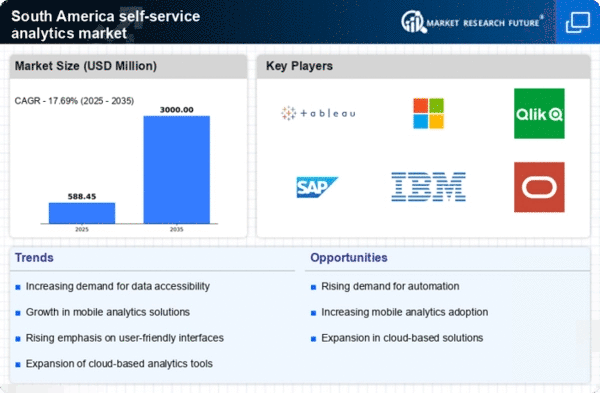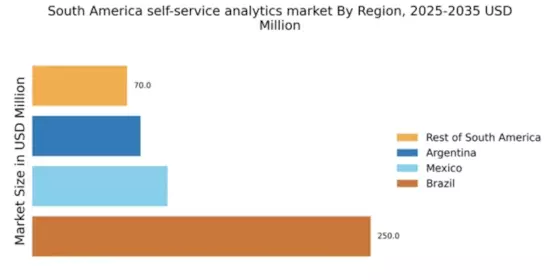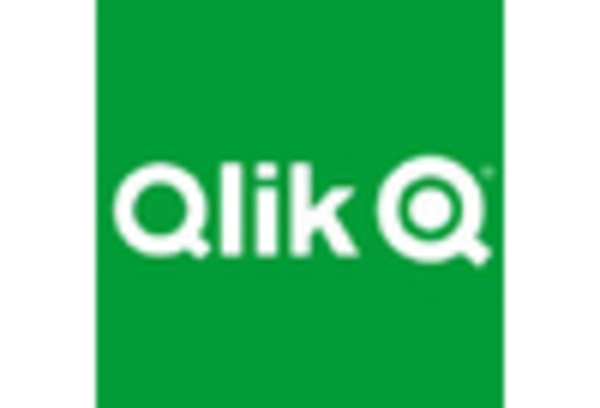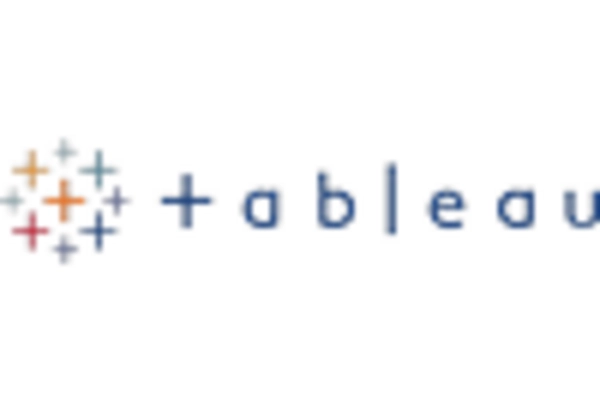Rise of Mobile Analytics Solutions
The self service-analytics market in South America is witnessing a significant rise in mobile analytics solutions. With the increasing penetration of smartphones and mobile devices, businesses are seeking ways to access and analyze data on-the-go. This trend is particularly relevant for field operations and sales teams that require real-time insights to make informed decisions. Recent data indicates that mobile analytics adoption has increased by over 30% in the last two years, reflecting a growing preference for flexibility and immediacy in data access. As organizations strive to enhance productivity and responsiveness, the self service-analytics market is likely to expand its offerings to include mobile-friendly platforms, enabling users to engage with analytics tools anytime and anywhere.
Emphasis on Data Governance and Security
In the self service-analytics market, there is an increasing emphasis on data governance and security, particularly in South America. As organizations adopt self service analytics tools, concerns regarding data privacy and compliance with regulations are becoming paramount. The rise of data breaches and cyber threats has prompted businesses to prioritize robust security measures. According to industry reports, nearly 60% of organizations in South America are investing in enhanced data governance frameworks to protect sensitive information. This focus on security is likely to shape the development of self service-analytics solutions, as vendors are expected to integrate advanced security features to ensure compliance and build trust among users. Consequently, the self service-analytics market may evolve to offer more secure and compliant analytics environments.
Growing Demand for Data-Driven Decision Making
The self service-analytics market in South America is experiencing a notable surge in demand for data-driven decision making. Organizations across various sectors are increasingly recognizing the value of leveraging data to inform strategic choices. This trend is particularly pronounced in industries such as retail and finance, where data insights can lead to enhanced customer experiences and operational efficiencies. According to recent estimates, the market is projected to grow at a CAGR of approximately 15% over the next five years. This growth is indicative of a broader shift towards analytics-driven cultures, where businesses prioritize data accessibility and usability. As a result, the self service-analytics market is likely to see a proliferation of tools designed to empower users to extract insights independently, thereby fostering a more agile and responsive business environment.
Increased Investment in Digital Transformation
The self service-analytics market is benefiting from increased investment in digital transformation initiatives across South America. Organizations are recognizing the necessity of modernizing their operations to remain competitive in a rapidly evolving landscape. This shift is driving the adoption of self service analytics tools, as businesses seek to empower employees with data access and insights. Recent surveys indicate that over 70% of companies in South America are allocating budgets specifically for digital transformation projects, with analytics being a key focus area. This trend suggests that the self service-analytics market is poised for growth, as organizations prioritize technologies that facilitate data-driven decision making and enhance overall operational efficiency.
Growing Importance of Training and Support Services
The self service-analytics market is increasingly recognizing the importance of training and support services to maximize user adoption and effectiveness. As organizations implement self service analytics tools, the need for comprehensive training programs becomes evident. Users must be equipped with the skills to navigate these tools effectively and derive meaningful insights. Recent findings suggest that companies investing in training initiatives see a 25% increase in user engagement with analytics platforms. This trend highlights the potential for growth in the self service-analytics market, as vendors are likely to expand their offerings to include robust training and support services, ensuring that users can fully leverage the capabilities of analytics tools.

















